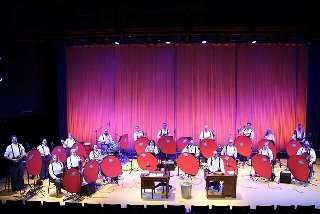|
Back
The Crossing Byrne~ing down the Glass House Philadelphia
Annenberg Center
02/21/2020 - & February 22, 2020
“Knee Plays”
Philip Glass: from Einstein of the Beach: Knee Plays 1, 3, 2, 4 (excerpts), 5 (excerpts)
David Byrne: CIVIL warS: “Tree (Today is an Important Occasion)” – “Things to Do (I’ve Tried)” – “Theadora is Dozing” – “The Sound of Business” “In the Future” – “Social Studies” – “The Gift of Sound (Where the Sun Never Goes Down)” (musical arrangements: Kevin Vondrak)
Dito van Reigersberg (narrator)
The Crossing, Donald Nally (conductor)

(© John C. Hawthorne)
#GLASSFEST is The Annenberg Center three-week festival of music composed by Philip Glass, with five programs over three weeks including concerts by pianist Jenny Lin, the Philip Glass Ensemble’s performance of the five-hour opus Music in 12 Parts and Philip Glass himself at the keyboard for the premiere of The White Lama , a co-composition by Glass and Tenzin Choegyal.
The festival launched with a concert staging of Knee Plays with two sold-out performances in the Annenberg’s intimate Harold Prince Theater. The set consists of two dark wood desks topped with silver microphones among a phalanx of red music stands, and a backdrop of illuminated boudoir string curtains.
The performance was already underway as the audience was filing in. The 18 members of The Crossing, barefooted and dressed in baggy cuffed trousers file onstage, one by one and they take turns sitting at the desks, reciting quantum physics number sequences, then taking their place in the orchestra.
The Crossing, under the musical directorship of Donald Nally, is carving new territory for contemporary choral music, and this time, the eighteen singers also had dual duties as the rigorous choristers and also playing their own instruments.
In a program note, Nally explains that Philip Glass breaks the musical elements down to the number of the beat to a measure and the solfège syllable assigned to each note sung for this mash-up of musical extracts from Glass’s opera Einstein of the Beach and David Byrne’s CIVIL warS.
Byrne, late of 80s art-rock band The Talking Heads and minimalist innovator Philip Glass’s vocalise are juxtaposed as a storytelling platform and cultural portrait of the 1970s, when the composers created the original works. There is also a thematic connection in that both Glass and Byrne’s convey in both of the original works, the phenomena of ‘Transformation.’ For our readers’ information, it is a reference to both composers using the terms “Knee Plays” in their original works referring to an entre-acte of musicians performing on the edge of the stage, in front of a closed curtain.
Actor van Reigersberg is the last to arrive and he is the Byrne proxy, moving from desk to desk, reading from and tearing up texts about Einstein, the big bang, quantum physics, some over Glass’s vocal pyrotechnical excerpts from ‘Beach’ in dazzling vocal transcriptions ostinato with the Crossing’s hypnotic of harmonic sculpturing.
The concept is so jarring that in some respects it was a musical bridge too far, and, at times buckles under its own conceptual weight. Some wayward moments were erased by spellbinding musical realms: Glass’s vocal pyrotechnics and Byrne’s forensic dramas. And Van Reigersberg's voice overs remained modular enough to communicate everything from non-sense text to narration about Einstein’s “biggest blunder” when first theorizing about the Big Bang. Later, Dito assured us that Einstein was “wrong saying that there is a cosmological constant, after all, that the universe is not just expanding, but accelerating.”
Those heady scientific facts are not going to override the musical importance of, say, Byrne’s song like Tree (Today is an important occasion) about a woman deciding what to wear, delivered by Dito with arch seriousness. Byrne’s importance of that red dress on the beach is just as cosmically vital as the theory of relativity.
Meanwhile, The Crossing was spitting atoms performing Glass’s staccato vocals. The technical precision of The Crossing was just as lustrous careening into Byrne’s Things to Do (I’ve Tried) Orleans blues dirge with the Crossing’s Michael Jones’ scorching trumpet solo engulfing the theater with pathos.
However incongruous, in the sinewy precision and harmonic suppleness of The Crossing, just as dynamic with Philip Glass pyrotechnics or Byrne’s borderless jazz, island romps, or cynical songs of Talking Heads hits.
The Crossing was clearly enjoying busting out of their often elegiac choral box just for funzies. And some cloying indulgences like The Sound of Business with a chorus member repeatedly reading a radio broadcast about selling eyeglasses in Time Square; during Byrne’s Social Studies the choristers strip down to their skivvies, following Dito’s lead without explanation and then ‘transform’ with floral housecoats, tight curly wigs and fake pearls. A decision perhaps made by Dito’s alter-ego diva cabaret singer Martha Graham Cracker.
Meanwhile, in a disclaimer in the program, the singers questioned how proficient they would be on the instrumentation, but they had nothing to disclaim, musically they were in the appropriate zone, vocally and orchestrally. The final numbers – Byrne’s The Gift of Sound (Where the Sun Never Goes Down), Glass’s luminous Knee Play 5 brought everyone in the audience to their feet.
Lewis Whittington
|